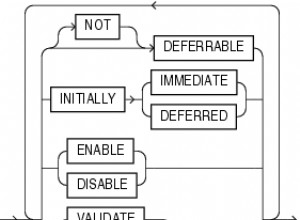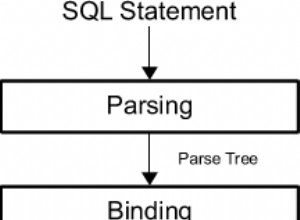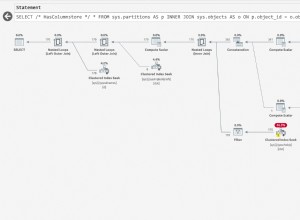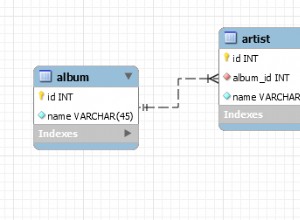मैंने ODP.NET में udtType सुविधा का उपयोग नहीं किया है, इसलिए मुझे यकीन नहीं है कि इसके साथ अपना लक्ष्य कैसे प्राप्त करें। हालांकि, स्ट्रिंग की एक सरणी पास करने के लिए आपको इसकी आवश्यकता नहीं है।
आपके द्वारा संलग्न किए गए दस्तावेज़ों की तरह, आपको एक पैकेज बनाने की आवश्यकता है जिसमें आपकी संग्रहीत प्रक्रिया है, और इनपुट पैरामीटर के रूप में एक सहयोगी सरणी (VARRAY नहीं) लेता है।
उदाहरण के लिए:
-- Create the table
CREATE TABLE TBLTEST (testID NUMBER, name VARCHAR2(50));
CREATE SEQUENCE seq_test
MINVALUE 1
START WITH 1
INCREMENT BY 1
NOCACHE;
CREATE OR REPLACE PACKAGE pkgTestArrayBinding
AS
-- Define an local scope associative array type called T_ASSOCIATIVE_ARRAY and make it as the type of input parameter
TYPE T_ASSOCIATIVE_ARRAY IS TABLE OF VARCHAR(50) INDEX BY PLS_INTEGER;
PROCEDURE TestArrayBinding(
Param1 IN T_ASSOCIATIVE_ARRAY,
Param2 IN T_ASSOCIATIVE_ARRAY);
END pkgTestArrayBinding;
/
CREATE OR REPLACE PACKAGE BODY pkgTestArrayBinding
AS
PROCEDURE TestArrayBinding(
Param1 IN T_ASSOCIATIVE_ARRAY,
Param2 IN T_ASSOCIATIVE_ARRAY)
AS
BEGIN
-- for all loop to insert them in a batch
FORALL indx IN 1..Param1.COUNT
INSERT INTO tblTest VALUES(seq_test.nextval, Param1(indx));
FORALL indx IN 1..Param2.COUNT
INSERT INTO tblTest VALUES(seq_test.nextval, Param2(indx));
END TestArrayBinding;
END pkgTestArrayBinding;
/
अब, इस कोड को चलाएँ, अपनी खुद की कनेक्शन स्ट्रिंग डालें।
namespace Con1
{
using System;
using System.Data;
using Oracle.DataAccess.Client;
/// <summary>
/// The program.
/// </summary>
internal class Program
{
#region Methods
/// <summary>
/// The main.
/// </summary>
private static void Main()
{
var con = new OracleConnection { ConnectionString = "User Id=usr;Password=pass;Data Source=XE" };
con.Open();
Console.WriteLine("Connected to Oracle" + con.ServerVersion);
// create command to run your package
var cmd = new OracleCommand("BEGIN pkgTestArrayBinding.TestArrayBinding(:Param1, :Param2); END;", con);
var param1 = cmd.Parameters.Add("Param1", OracleDbType.Varchar2);
var param2 = cmd.Parameters.Add("Param2", OracleDbType.Varchar2);
param1.Direction = ParameterDirection.Input;
param2.Direction = ParameterDirection.Input;
// Specify that we are binding PL/SQL Associative Array
param1.CollectionType = OracleCollectionType.PLSQLAssociativeArray;
param2.CollectionType = OracleCollectionType.PLSQLAssociativeArray;
// Setup the values for PL/SQL Associative Array
param1.Value = new[] { "First Element", "Second Element ", "Third Element_" };
param2.Value = new[] { "Fourth Element", "Fifth Element ", "Sixth Element " };
// Specify the maximum number of elements in the PL/SQL Associative Array
// this should be your array size of your parameter Value.
param1.Size = 3;
param2.Size = 3;
// Setup the ArrayBindSize for each elment in the array,
// it should be bigger than the original length of element to avoid truncation
param1.ArrayBindSize = new[] { 13, 14, 13 };
// Setup the ArrayBindSize for Param2
param2.ArrayBindSize = new[] { 20, 20, 20 };
// execute the cmd
cmd.ExecuteNonQuery();
// I am lazy to query the database table here, but you should get you data now.
// watch what happened to element "Third Element_"
// Close and Dispose OracleConnection object
con.Close();
con.Dispose();
Console.WriteLine("Disconnected");
}
#endregion
}
}




